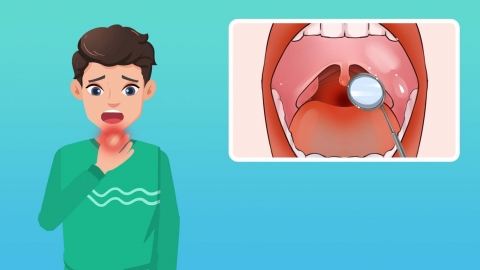What should I do if my throat hurts when I swallow saliva?
Generally, the term "throat" refers to the pharynx. Sore throat and pain when swallowing saliva may be caused by factors such as dry environment, dietary irritation, acute pharyngitis, tonsillitis, or epiglottitis. Treatment options include general care and medication under a doctor's guidance. If symptoms persist, prompt medical attention is advised. Detailed explanations are as follows:

1. Dry Environment
When the ambient air humidity is low, the moisture on the pharyngeal mucosa evaporates quickly, causing the mucosa to become dry and fragile. This change stimulates the sensory nerve endings in the throat, resulting in pain when swallowing saliva. Using a humidifier to regulate indoor humidity, especially during dry seasons or in air-conditioned or heated environments, can help alleviate this issue.
2. Dietary Irritation
Consuming excessive spicy, hot, or acidic foods can directly irritate the pharyngeal mucosa. The components in these foods may damage the mucosa, triggering an inflammatory response that causes throat pain. During swallowing, the movement of the throat further irritates the injured mucosa, intensifying the pain. Maintaining a balanced diet, reducing intake of irritants, and increasing consumption of vegetables and fruits rich in vitamins can help protect the pharyngeal mucosa.
3. Acute Pharyngitis
Acute pharyngitis is primarily caused by viral or bacterial infections. After infecting the throat, viruses or bacteria multiply extensively on the pharyngeal mucosa, triggering an inflammatory response that may lead to mucosal congestion and swelling. This stimulates nerve endings, causing pain during swallowing when throat muscles contract and compress the swollen mucosa, intensifying the discomfort. Symptoms may also include fever and fatigue. Medications such as Cefalexin Granules, Amoxicillin Capsules, and Roxithromycin Dispersible Tablets may be used under medical supervision for treatment.
4. Tonsillitis
Tonsillitis is usually caused by bacterial infections, such as group A beta-hemolytic streptococcus. Inflammation of the tonsils may result in redness, swelling, and pus formation. During swallowing, movement of the throat affects the inflamed tonsils, stimulating surrounding nerve endings and causing severe pain. Additional symptoms may include chills and headache. Medications such as Roxithromycin Capsules, Golden Lotus Granules, and Pudilan Xiaoyan Tablets may be used under medical guidance to alleviate symptoms.
5. Epiglottitis
Epiglottitis is often caused by bacterial infection or allergic reaction. When the epiglottis swells, it can obstruct the laryngeal cavity, intensifying pain during swallowing. Other symptoms may include difficulty breathing and fever. Patients may be advised by a physician to use medications such as Cefuroxime Axetil Tablets, Dexamethasone Acetate Injection, and Acyclovir Tablets for treatment.
In daily life, it is important to exercise regularly, strengthen physical health, improve immunity, and reduce the risk of respiratory infections. Practicing good oral hygiene, brushing teeth properly in the morning and evening, and rinsing the mouth after meals can help prevent bacterial growth.







